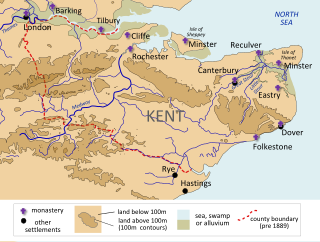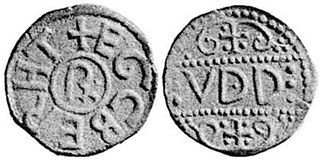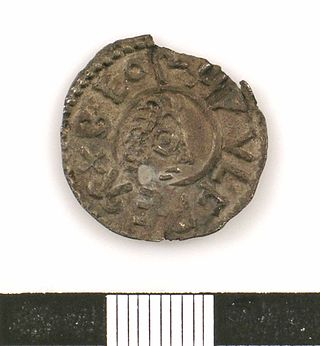
Year 669 (DCLXIX) was a common year starting on Monday of the Julian calendar. The denomination 669 for this year has been used since the early medieval period, when the Anno Domini calendar era became the prevalent method in Europe for naming years.

Offa was King of Mercia, a kingdom of Anglo-Saxon England, from 757 until his death. The son of Thingfrith and a descendant of Eowa, Offa came to the throne after a period of civil war following the assassination of Æthelbald. Offa defeated the other claimant, Beornred. In the early years of Offa's reign, it is likely that he consolidated his control of Midland peoples such as the Hwicce and the Magonsæte. Taking advantage of instability in the kingdom of Kent to establish himself as overlord, Offa also controlled Sussex by 771, though his authority did not remain unchallenged in either territory. In the 780s he extended Mercian Supremacy over most of southern England, allying with Beorhtric of Wessex, who married Offa's daughter Eadburh, and regained complete control of the southeast. He also became the overlord of East Anglia and had King Æthelberht II of East Anglia beheaded in 794, perhaps for rebelling against him.

Æthelred I was King of Wessex from 865 until his death in 871. He was the fourth of five sons of King Æthelwulf of Wessex, four of whom in turn became king. Æthelred succeeded his elder brother Æthelberht and was followed by his youngest brother, Alfred the Great. Æthelred had two sons, Æthelhelm and Æthelwold, who were passed over for the kingship on their father's death because they were still infants. Alfred was succeeded by his son, Edward the Elder, and Æthelwold unsuccessfully disputed the throne with him.

Ecgberht, also spelled Egbert, Ecgbert, Ecgbriht, Ecgbeorht, and Ecbert, was King of Wessex from 802 until his death in 839. His father was King Ealhmund of Kent. In the 780s, Ecgberht was forced into exile to Charlemagne's court in the Frankish Empire by the kings Offa of Mercia and Beorhtric of Wessex, but on Beorhtric's death in 802, Ecgberht returned and took the throne.

Æthelwulf was King of Wessex from 839 to 858. In 825, his father, King Ecgberht, defeated King Beornwulf of Mercia, ending a long Mercian dominance over Anglo-Saxon England south of the Humber. Ecgberht sent Æthelwulf with an army to Kent, where he expelled the Mercian sub-king and was himself appointed sub-king. After 830, Ecgberht maintained good relations with Mercia, and this was continued by Æthelwulf when he became king in 839, the first son to succeed his father as West Saxon king since 641.

Æthelbald was King of Wessex from 855 or 858 to 860. He was the second of five sons of King Æthelwulf. In 850, Æthelbald's elder brother Æthelstan defeated the Vikings in the first recorded sea battle in English history, but he is not recorded afterwards and probably died in the early 850s. The next year Æthelwulf and Æthelbald inflicted another defeat on the Vikings at the Battle of Aclea. In 855 Æthelwulf went on pilgrimage to Rome and appointed Æthelbald King of Wessex, while Æthelberht, the next oldest son, became King of Kent, which had been conquered by Wessex thirty years earlier.

Æthelberht was the King of Wessex from 860 until his death in 865. He was the third son of King Æthelwulf by his first wife, Osburh. Æthelberht was first recorded as a witness to a charter in 854. The following year Æthelwulf went on pilgrimage to Rome and appointed his oldest surviving son, Æthelbald, as king of Wessex while Æthelberht became king of the recently conquered territory of Kent. Æthelberht may have surrendered his position to his father when he returned from pilgrimage, but resumed the south-eastern kingship when his father died in 858.

Hlothhere was a King of Kent who ruled from 673 to 685.
Egbert is a name that derives from old Germanic words meaning "bright edge", such as that of a blade. Anglo-Saxon variant spellings include Ecgberht and Ecgbert. German variant spellings include Eckbert and Ekbert.
Ealhmund was King of Kent in 784. He is reputed to be the father of King Egbert who was King of Wessex and, later, King of Kent. Asser's The Life of King Alfred identifies him as the son of Eafa.

The Kingdom of the Kentish, today referred to as the Kingdom of Kent, was an early medieval kingdom in what is now South East England. It existed from either the fifth or the sixth century AD until it was fully absorbed into the Kingdom of Wessex in the late 9th century and later into the Kingdom of England in the early 10th century.

The Battle of Ellendun or Battle of Wroughton was fought between Ecgberht of Wessex and Beornwulf of Mercia in September 825. Sir Frank Stenton described it as "one of the most decisive battles of English history". It effectively ended Mercian Supremacy over the southern kingdoms of Anglo-Saxon England and established West Saxon dominance in southern England.
Ecgberht I was a King of Kent (664-673), succeeding his father Eorcenberht.

Eadric was a King of Kent (685–686). He was the son of Ecgberht I.

Ecgberht II was king of Kent jointly with Heaberht.

Beornwulf was King of Mercia from 823 to 826. His short reign saw the collapse of Mercia's supremacy over the other kingdoms of the Anglo-Saxon Heptarchy.

Wiglaf was King of Mercia from 827 to 829 and again from 830 until his death. His ancestry is uncertain: the 820s were a period of dynastic conflict within Mercia and the genealogy of several of the kings of this time is unknown. Wigstan, his grandson, was later recorded as a descendant of Penda of Mercia, so it is possible that Wiglaf was descended from Penda, one of the most powerful seventh-century kings of Mercia.
Wihtred was king of Kent from about 690 or 691 until his death. He was a son of Ecgberht I and a brother of Eadric. Wihtred ascended to the throne after a confused period in the 680s, which included a brief conquest of Kent by Cædwalla of Wessex, and subsequent dynastic conflicts. His immediate predecessor was Oswine, who was probably descended from Eadbald, though not through the same line as Wihtred. Shortly after the start of his reign, Wihtred issued a code of laws—the Law of Wihtred—that has been preserved in a manuscript known as the Textus Roffensis. The laws pay a great deal of attention to the rights of the Church, including punishment for irregular marriages and for pagan worship. Wihtred's long reign had few incidents recorded in the annals of the day. He was succeeded in 725 by his sons, Æthelberht II, Eadberht I, and Alric.
The Battle of Otford was a battle fought in 776 between the Mercians, led by Offa of Mercia, and the Jutes of Kent. The battle took place at Otford, in the modern English county of Kent.

Domne Eafe, also Domneva, Domne Éue, Æbbe, Ebba, was, according to the Kentish royal legend, a granddaughter of King Eadbald of Kent and the foundress of the double monastery of Minster in Thanet Priory at Minster-in-Thanet during the reign of her cousin King Ecgberht of Kent. A 1000-year-old confusion with her sister Eormenburg means she is often now known by that name. Married to Merewalh of Mercia, she had at least four children. When her two brothers, Æthelred and Æthelberht, were murdered she obtained the land in Thanet to build an abbey, from a repentant King Ecgberht. Her three daughters all went on to become abbesses and saints, the most famous of which, Mildrith, ended up with a shrine in St Augustine's Abbey, Canterbury.